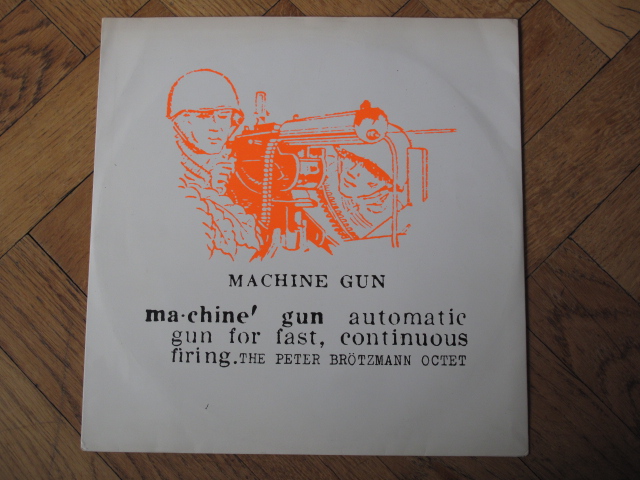
#The peter brötzmann octet machine gun free
You wanna talk free jazz? Machine Gun is the chaotic sound of eight guys in a small studio all playing at odds with one another and is only free to the extent that it managed to escape from an asylum somewhere. Oh yeah, and while they’re each blowing away in total non-syncopation they’re also dodging the sizzling red-hot iron fragments coming from the direction of the two drummers, both of whom also seem oblivious to one another’s presence.
#The peter brötzmann octet machine gun full
It makes those free jazz landmarks sound like Duke Ellington in comparison.įrom its very start (no warming up for these guys) Machine Gun comes at you like an explosion in an iron foundry full of crashing piledrivers and shrieking grinders, where three guys on saxophone are producing insane sheets of noise and berserk blurts and skronks, each of them following their own individual “sonic energy” muse like the other two guys aren’t even there. Think yer some kinda hot shit noise aficionado cuz you’ve managed to sit through John Coltrane’s Ascension or Albert Ayler’s Spiritual Unity? I dare you to check out Machine Gun. Suffice it for now to say that Machine Gun is one of the most abrasive, anarchic, and hair-raising free jazz albums to ever set your synapses sizzling like overworked bug zappers. Where, you may be wondering, does German saxophonist Peter Brötzmann’s seminal 1968 European free jazz recording Machine Gun come into this? Patience, friend, patience.

It’s kinda like playing kamikaze frisbee, only instead of a frisbee you’re playing with live rounds. It’s more of a case of very quickly covering your balls and contorting yourself into as small a target as possible for that rebounding slug. Not that it’s really possible to dodge a ricocheting bullet they’re pretty darn fast. “Dodge the Ricochet” is fun and easy to play and basically involves standing maybe six feet away from a brick wall and then taking potshots at said wall with your dad’s kid-sized. That water heater was a casualty of war, and its shooting was just one of those things that happens when you’re abruptly levitated out of bed in shock and awe in the form of some ferocious Pharaoh Sanders free jazz skronk playing at maximum volume on your younger brother’s stereo at 10:00 on a hungover Sunday morning, and then proceed to get half drunk and decide it would be a real cool idea to go down to the basement of your parent’s house in Littlestown, Pennsylvania to play a lively game of “Dodge the Ricochet.” He died of a heart attack in New York City in 2002.We didn’t mean to shoot the water heater. Specific works included Die Klage der Kaiserin (1989) with Pina Bausch, short pieces (since 1989) with Jean Sasportes, The spirit of adventure (1990) with Anastasia Lyra, Wasser in der Hand (1990/91) with Christine Brunel, and Futan no sentaku/ The burden of choice (1990/91) with Min Tanaka and Butch Morris.īesides his duo work with singers such as Jeanne Lee, Diamanda Galás, Anna Homler or Sainkho Namtchylak, Peter was especially interested in his international improvising ensemble Global Village with musicians from different cultural regions of the world: China, Japan, Near East, South Europe, North and South America.

In addition, Kowald collaborated extensively with poets and artists and with the dancers Gerlinde Lambeck, Anne Martin (formerly of Pina Bausch Ensemble), Tadashi Endo, Patricia Parker (founder of the Vision Festival), Maria Mitchell, Sally Silvers, Cheryl Banks (formerly of Sun Ra's Arkestra), Arnette de Mille, Sayonara Pereira, and Kazuo Ohno. He also recorded a number of pioneering double bass duets with Maarten Altena, Barry Guy, Joëlle Léandre, Barre Phillips, William Parker, Damon Smith and Peter Jacquemyn.

He also recorded a number of solo double-bass albums, and was a member of the London Jazz Composer's Orchestra until 1985. Seigfried, Conny Bauer, Jeffrey Morgan, Wadada Leo Smith, Günter Sommer, William Parker, Barre Phillips, Joëlle Léandre, Alfred Harth, Lauren Newton and Evan Parker. A member of the Globe Unity Orchestra, and a touring double-bass player, Kowald collaborated with a large number of European free jazz and American free-jazz players during his career, including Peter Brötzmann, Irène Schweizer, Karl Berger, Fred Anderson, Hamid Drake, Karl E.


 0 kommentar(er)
0 kommentar(er)
